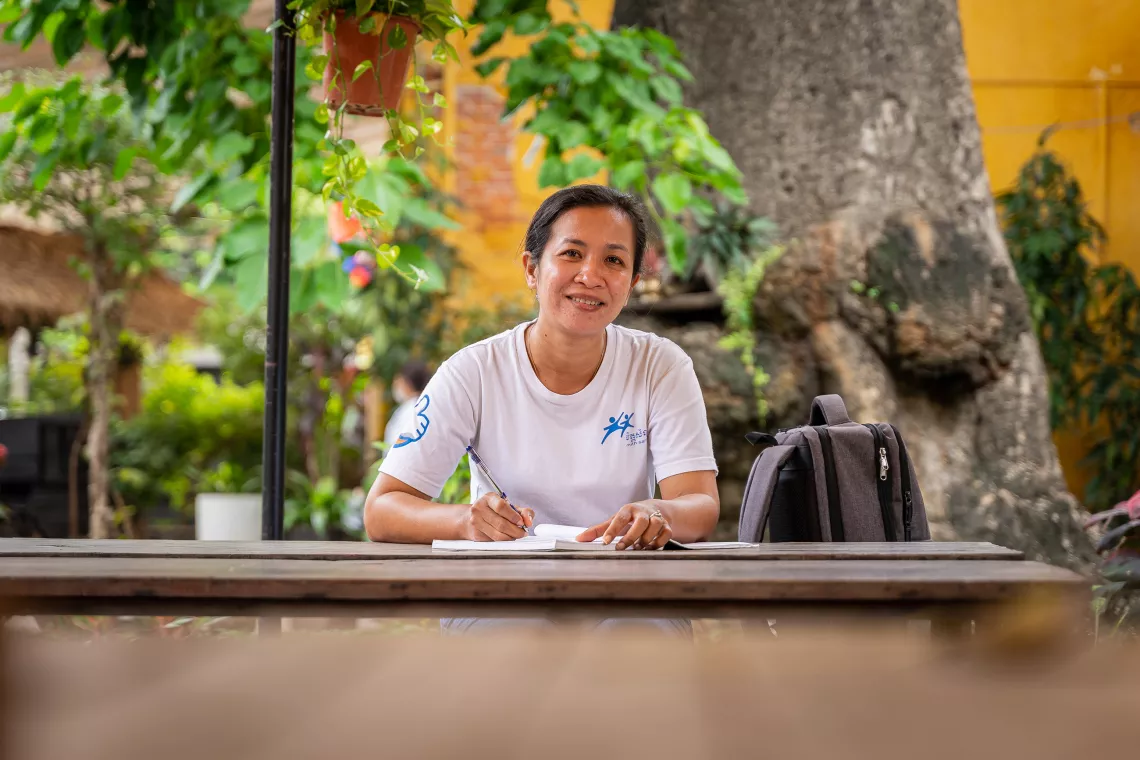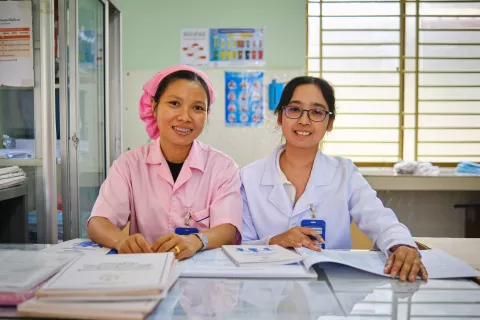Case collaboration supports vulnerable children
Government and NGO case workers join hands to help victims of violence and their families get much needed social services to transition from trauma to stability

- Available in:
- English
- Khmer
What started as a quiet day at home turned into a tragedy in Takhmao.
Rachana1 is the only child from her mother Pagna2's first marriage. Her mother has two daughters with her new husband and another child on the way. Her mom works long hours in construction and her stepfather, who doesn't have regular work, is often the only adult at home. 11-year-old Rachana and her stepfather have always had difficulties, but when schools closed as a result of the pandemic, difficult escalated to dangerous.
One day, when her mother was at work and her younger sisters were playing outside, Rachana experienced the unthinkable. She was raped by her stepfather, who threatened to further harm her and the family if she told anyone. This distressing situation continued until her mother discovered evidence of the abuse. After speaking to Rachana, Pagna went immediately to the police, who arrested the stepfather on the same day.
The police handling the case contacted Ms. Khun Sopheak, Deputy Chief of the District Office of Social Affairs and Social Welfare (DOSWA) in Kandal Province. Sopheak in turn reached out to Ms. Sok Lyka, a social worker at Mith Samlanh, a non-profit organization that provides support to families going through such traumas. Sopheak and Lyka visited Rachana and her family the next day, to assess their needs and connect them with the right resources - psychosocial support, legal counsel, and financial aid - as quickly as possible.
Supporting the transition from trauma to stability is a delicate and complicated process that requires expertise, compassion and exceptional collaboration on each case. Each actor has their part to play to help victims and their families heal and for justice to be served.
Family is the first line of defense in child protection - keeping violence out of the home, and if it arrives, being aware of where and how to report it, just as Pagna did for Rachana. The police must be familiar with children's rights in the justice system, follow child friendly procedures and most importantly, reach out quickly to government social service workers in their district, like Sopheak. The Ministry of Social Affairs, Veterans, and Youth Rehabilitation (MoSVY), through its DOSWA offices, has a coordination role that ensures correct process, helps uphold the child's rights and connects victims and their families with the right specialized services. Social workers from the non-profit sector, like Lyka, provide psychosocial counseling and work hand-in-hand with social service workers from the government to create the right network of support services around victims of violence.

Building child protection systems to today’s levels has taken time and coordinated effort from many actors. While progress has certainly been made, there is still work to be done to ensure that cases like Rachana’s are far less common.
UNICEF is supporting MoSVY to strengthen the national child protection system and build the capacity of district officers, like Sopheak, who are among the first appointed government officers with a clear job description focused solely on child protection. They are undergoing trainings to receive accreditation as paraprofessional social workers. These government social workers will play a crucial role in keeping Cambodian children increasingly more protected.
However, for now, government at the local level still needs complementary support to provide the best possible service to at risk children. The Partnership Programme for the Protection of Children (3PC) was established in 2011 to address the need for government and the non-profit providers to work together as seamlessly as possible. 3PC supports coordination across MoSVY, UNICEF and Friends-International to strengthen the national child protection system. Friends-International, which incorporates Mith Samlanh where Lyka works, coordinates an umbrella of thirteen NGOs and 40+ community-based organizations.
It was 3PC’s well-established network of partners, working together, that allowed Rachana's family to get the right support, while Primero allowed that access quickly. Primero digital case management, launched in mid-2020 and rolled out with UNICEF-supported training to all districts, makes it easier than ever for government social service workers, like Sopheak, to officially register at risk children and connect them to the right social services, while keeping their personal information confidential.
“The role of a strong social service workforce and coordinated national systems are more important than ever as we work to offset the impacts of the pandemic, which has increased the risk of violence or abuse, particularly in the home,” said Lucia Soleti, UNICEF’s Chief of Child Protection. "UNICEF is proud to work with the government and other 3PC partners to build the technical capacity of this workforce so that it can effectively protect children against violence, in a collaborative way that brings together the government and civil society partners. We are grateful for the ongoing financial support from partners like the USAID, Government of Japan and the Australian Government through the Australian NGO Cooperation Program (ANCP) to build Cambodia’s child protection system.”

Lyka stressed the importance of working with the family to provide strong support for affected children to recover, heal and most important, to help prevent future violence. “On my first visit, the mother was very scared that the stepdad would get out of jail and harm her family”, Lyka explained. Through regular counselling, Lyka has seen Pagna "become focused on the present and making sure her daughter is safe. She even knows how to encourage her daughter to express her feelings.”
While Rachana's stepfather remains in custody awaiting trial, Lyka and Sopheak are working together to ensure Pagna is fully supported to go through the difficult process of providing evidence. Lyka proudly shared that Pagna "is strong and ready to see this through to the end for the safety of her family.” This is important because, as Sopheak noted, "If the families don't understand the process and don't get solid advice along the way, sometimes they give up before their case goes before a judge.” Sopheak is making sure that Pagna understands each step of the legal and administrative process, and that she has access to expert legal counsel, who ensure that the case advances.
Financial stability for the family is also fundamental to recovery. Since reporting her husband and his subsequent arrest, Pagna stopped working outside the home to keep a close watch on her girls, and instead began a home-based clothes-washing business. While it brings in some money, it's less than she made before. During this transitional time, Mith Samlanh is supplying a small stipend and helping Pagna plan for the expansion of her business. Sopheak, meanwhile, is working with Pagna to see if the family qualifies for IDPoor status so they can enroll in the national cash transfer programme and receive essential social services from the Government. If they meet all the requirements, Sopheak will help Pagna finish the process and file the paperwork correctly.
Both Lyka and Sopheak are happy to report that the home environment has much improved over the last few months. Rachana is sharing more during Lyka's check-ins, with her mom between visits, and has resumed her studies. Most importantly, she is starting to think about the future. She told Lyka, “I can’t wait to finish high school and continue my studies even further to become a teacher or doctor so I can help take care of my family.”
1 Name changed to protect the privacy of the people involved
2 Name changed to protect the privacy of the people involved





